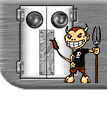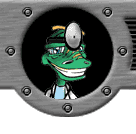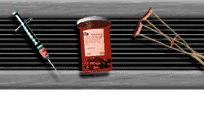P
|
Physiologcial development is generally complete.
Nearly
all students have acquired secondly sexual characteristics.
Male
height may continue to develop, but body definition is generally
set.
Acceptance
of the body and physiognomy is occurring, and new emphasis on dress
and appearance are typical.
Emphasis
on sexuality and appreciation by the opposite sex are common and
signal an acceptance of recent growth and change.
Primping
and discussion of "in" perfume or style is age appropiate.
Anxiety
about the body or inability to accept the changes may result in
obsessive attention to diet, weight building or exercise.
|
E
|
Initimacy vs. Isolation
The
traumatic/dramatic effort to find the lost self becomes more rational
and less intense.
There
is an emerging sense of self identity, of who and what the person
is becoming.
The
lessened need to be one type of person for peers helps a sense of
integrity for formulate.
A
"second person perspective" may truly emerge helping the person
to recognize other needs outside of the self.
Self-reliance
becomes important.
There
is a deepening need to reach out, give of the self and meet the
needs of less fortunate others.
Those
who have been over-indulged may have a new sense of improvishment
due to inability to get outside of self, put another first.
The
person is more able to take a "no" answer without feeling a sense
of personal loss, anger.
|
P
|
The student may begin to identify beyond adolescence and peerage to
member of community. If so, then moral reasoning will focus on protecting
the society and following community guidelines.
The
dichotomoy can most easily be seen as two paths: "I've got to be
me" is more immature - stage three "For the good of all" is a movement
toward recognition of stage four membership in the community.
Classical
literature may help with conslidation of personal growth and curtail
a sense of isolation.
Laws
may take on a new meaning as a source of security and honor.
There
may be recognition of the need to establish a belief system for
self - not a reflection of childhood or peers and a sense of the
importance of meeting the best good society.
|
S
|
The need for peer approval uses much of the student's energy.
Students
who are holding to group membership as personal identification may
be less dependent or take leadership roles in the group or "gang".
The
self is more defined as a self and less dependent on external acceptance.
Family
conflict may lessen due to student equilibrium, but it will resume
if a basic appreciation for each member as a person in not achieved
or practiced.
Some
youngsters are now looking to intimacy for definition and gratification
of sexual drives.
World
of work becomes very real for those who do not plan for college.
Social
integration of self as more than self may lead to "citizen of the
world" perception for some.
|
I
|
Formal Operations are in effect in both mathematical and verbal domains.
Reasoning
ability and logic give a sense of pleasure.
Thoughts
and ideas appear to be ways to solve problems and facilitate change.
A
feeling of idealism and consolidation often blooms.
The
student often wishes to "change the world" based on ideas and the
shear will to make a difference, solve problems.
Systematic
and sequential reasoning become easy and fulfilling.
Synthesis
becomes easier and rewarding.
|
















